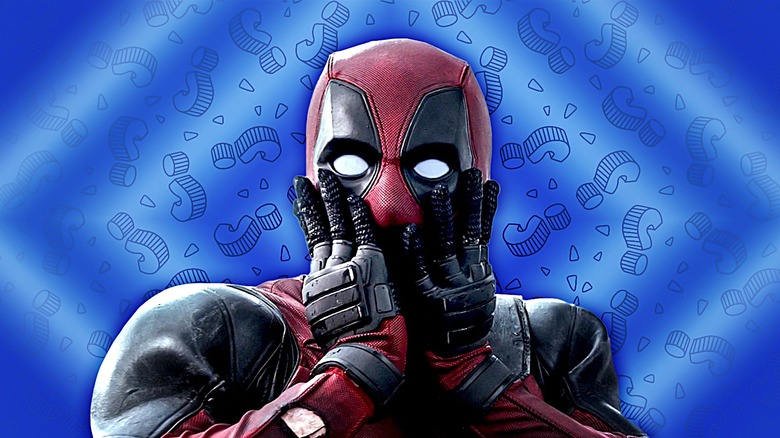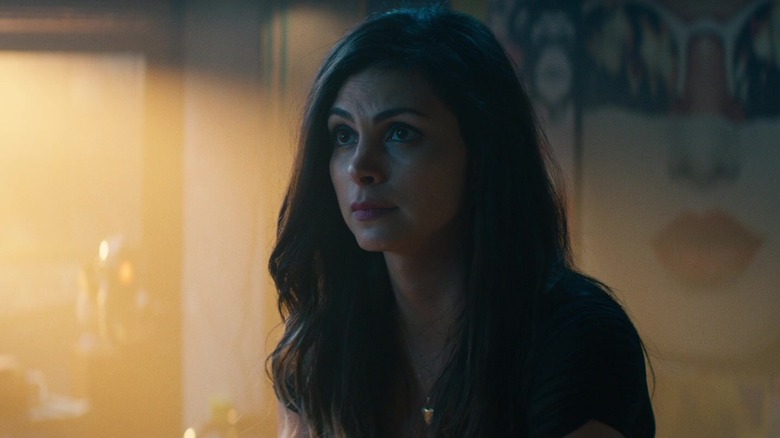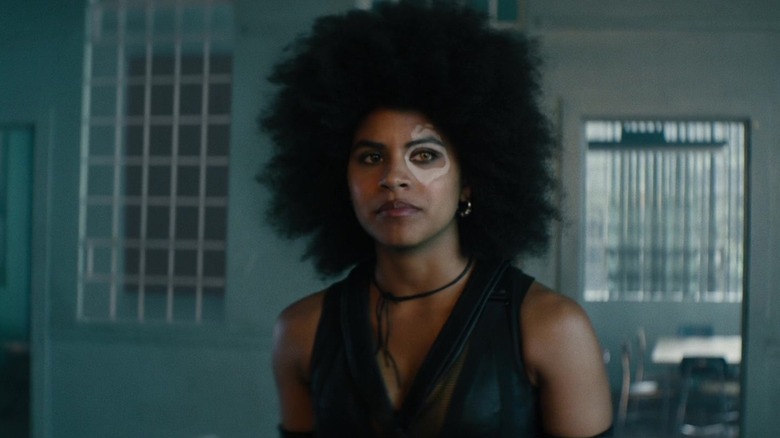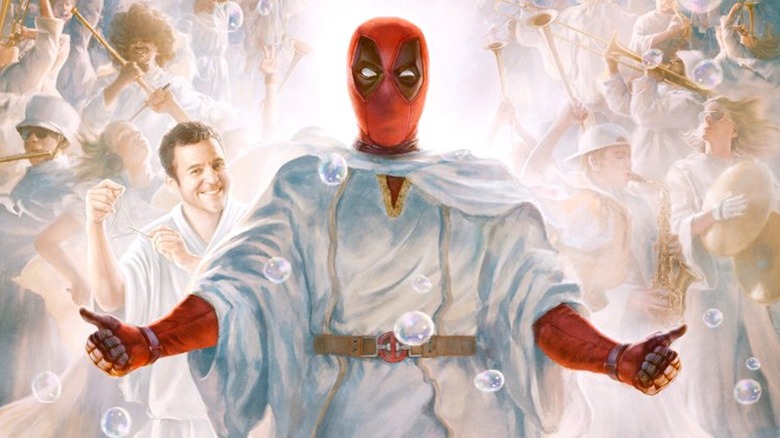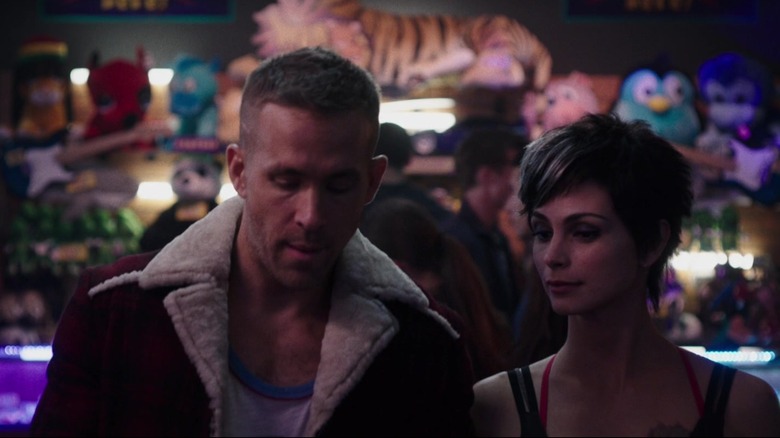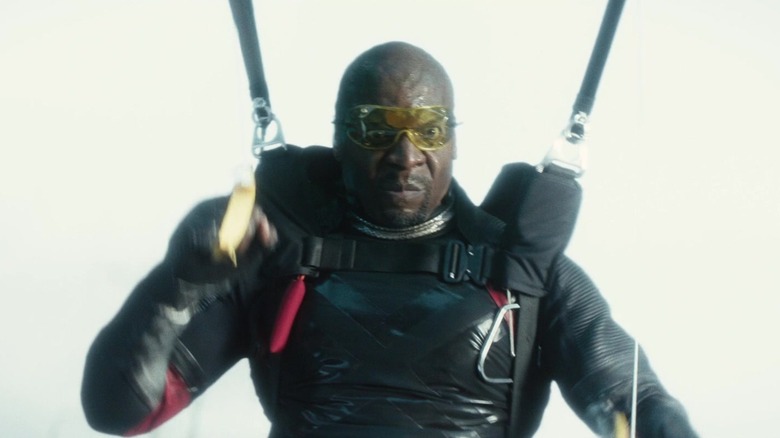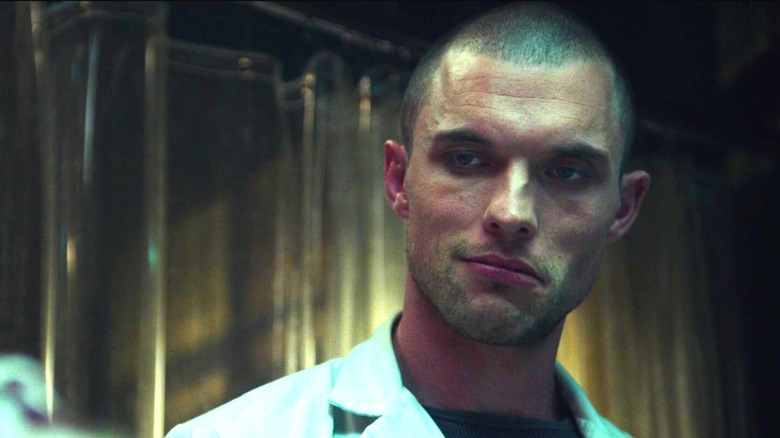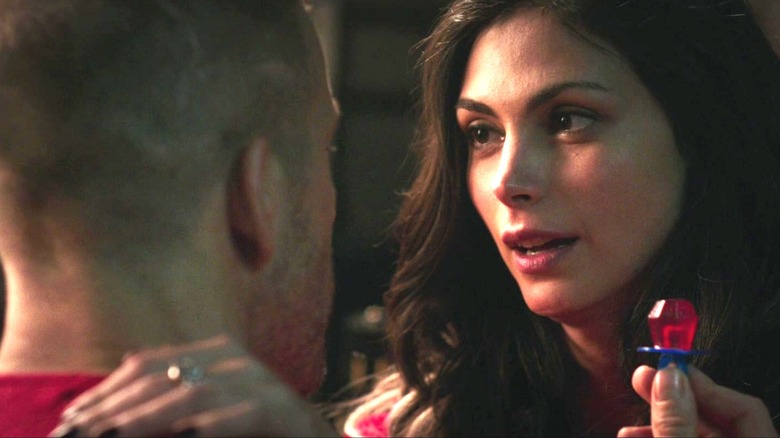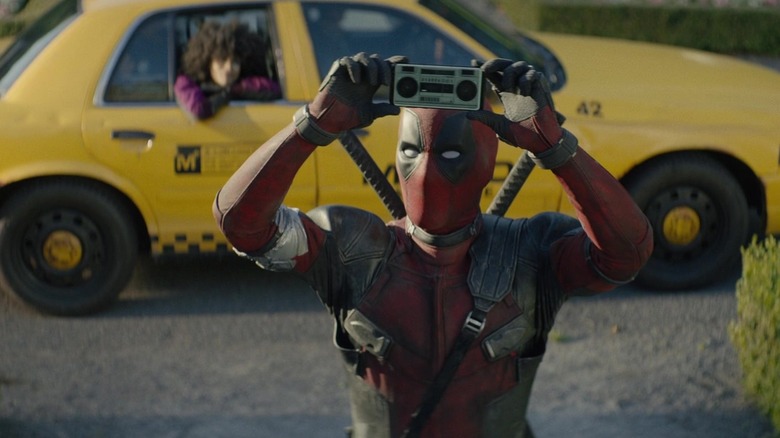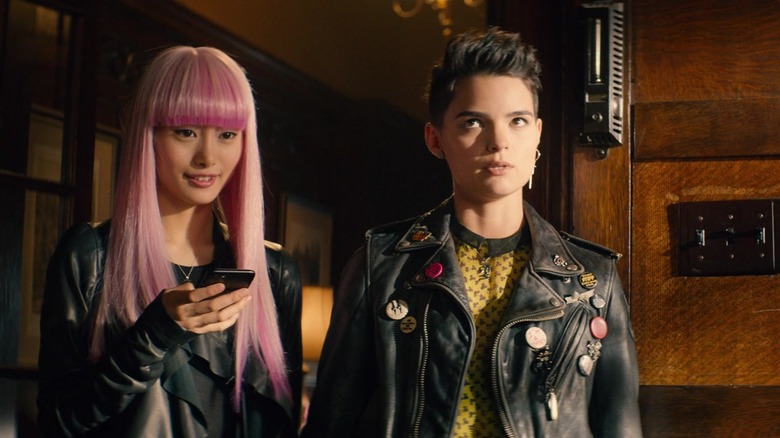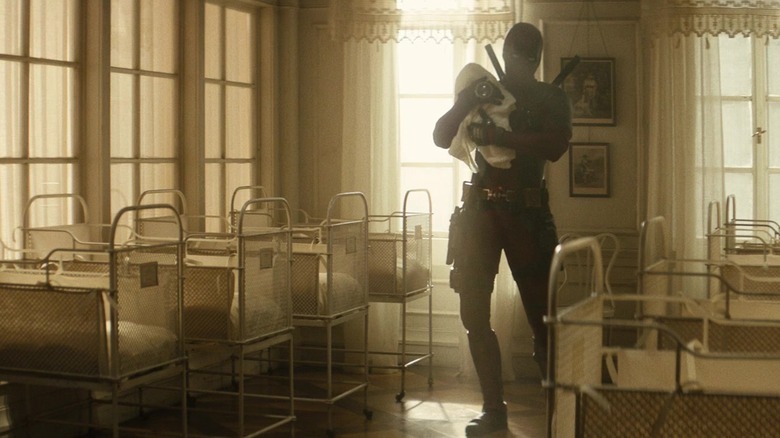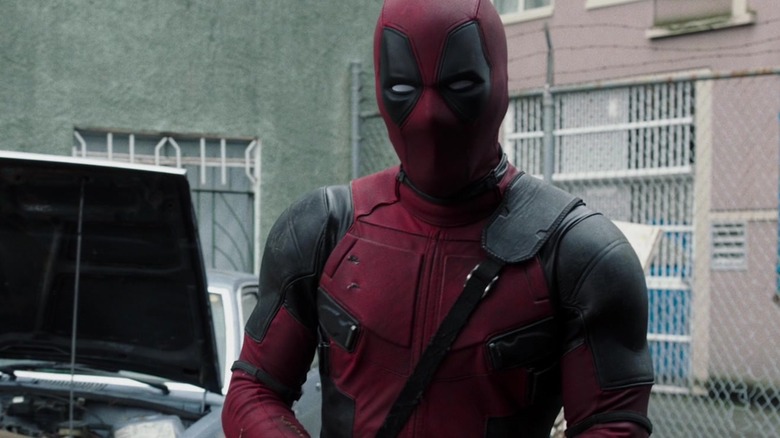Deadpool's Most Controversial Moments
Deadpool? Controversial? What on Earth gave you that idea? It's only an R-rated superhero franchise that cracks plenty of phallic jokes and is willing to mock almost every aspect of pop culture. So it's inconceivable that these movies could offend anyone, much less spark any controversy.
But let's suppose, for a second, that certain moments from the "Deadpool" movies would get the audience's knickers in a twist. Let's imagine that a few jokes from these movies might have taken it too far, offending everyone from Mormons to DC Comics fans. In this hypothetical scenario, maybe the wildest joke in the movie would, like our beloved X-Force gang, fail to stick the landing. Who knows? Maybe even that notorious sex scene between Ryan Reynolds' Deadpool (aka Wade Wilson) and Vanessa (Morena Baccarin) would rub people the wrong way.
Since the multiverse is becoming quite popular in superhero films, let's take a trip to an alternate universe where "Deadpool" is controversial and then explore its biggest points of contention.
Fridging Vanessa
Okay, so the "Deadpool" films might have gotten under some people's skin — and one major death in the sequel was one of the biggest sources of controversy. When Vanessa died in "Deadpool 2," many viewers were upset that this beloved character was killed just to advance the story. Some have accused the movie of "fridging" — a trope in superhero stories in which a female character dies a gruesome death for no reason other than to motivate the male hero.
Critics have debated whether Vanessa's death constitutes fridging. Princess Weekes, writing for The Mary Sue, insists that it is fridging, especially because there were other ways to motivate Deadpool that didn't involve Vanessa dying. (In fact, the earliest pitches for the sequel had Vanessa alive and well, a version of "Deadpool 2" that we almost got to see.)
Meanwhile, others say the jury may still be out on Vanessa's death. Vox has pointed out that Vanessa was fleshed out as a three-dimensional character in the first movie, so it can hardly be said that her character exists purely to motivate Deadpool. Even Gail Simone, the comic writer who coined the term "fridging," weighed in on X (formerly called Twitter). For a character to be fridged, @GailSimone wrote, "she no longer really exists in the story [after she dies], her agony is just a motivator, and she's never really a person in that scenario." Since Vanessa is still very much important to the story after her death, talking with Wade from beyond the grave, she may not qualify. In any event, Vanessa doesn't stay dead, and she is set to appear in "Deadpool and Wolverine."
The Martha joke
Deadpool is not shy about poking fun at the Caped Crusader — the look on Cable's (Josh Brolin) face when Deadpool declares, "I'm Batman" is priceless. Yet one line hurled at Batman in "Deadpool 2" was not amusing to many DC Comics fans.
To explain why he's late, Deadpool tells Vanessa, "I was fighting a caped badass, but then we discovered his mom is named Martha, too." This is referencing an infamous scene from "Batman vs. Superman: Dawn of Justice," in which Batman (Ben Affleck) changes his mind about killing Superman (Henry Cavill) after he discovers they both have a mother named Martha. Some reviewers thought this "Deadpool 2" line was a hoot, since it called out one of the most contrived superhero moments in recent memory. Others, however, felt the jab was uncalled for, especially because the moment had already been memed to death on the Internet. On Reddit, u/ArmchairCritic1 wrote in the DC Cinematic Universe subreddit, "I think the Martha jokes are lazy. And if They used one in Deadpool than they took the easy route." Why make an obvious observation about a movie everybody knows is bad, when the filmmakers could make shrewder jokes (such as Deadpool's remark that comic creator Rob Liefield can't draw feet)?
In an interview with Empire Film Podcast (via ScreenRant), Ryan Reynolds defended the Martha joke, insisting, "I think Deadpool is willing to break a few eggs to make that omelet." As a disclaimer, however, he added that this particular joke wasn't his idea.
The controversial Once Upon a Deadpool poster
The promotional campaign for "Once Upon a Deadpool" (the special PG-13 cut of "Deadpool 2") featured a heavenly movie poster. This poster depicts an iconic religious painting, except in place of Jesus, Deadpool is wearing angelic robes. Understandably, some Christian viewers were offended by the implicit comparison.
That deeply religious viewers would find the jokes in "Deadpool" offensive is hardly breaking news, and this is far from the only time Deadpool has poked fun at religion. (Let's not forget that he announces he's "Marvel Jesus" in the trailer for "Deadpool and Wolverine.") However, this particular controversy is worth mentioning because the poster's detractors accused it of targeting one Christian denomination in particular.
A petition on Change.org challenged the poster, insisting that it mocked The Church of Jesus Christ of Latter-day Saints (aka LDS). The poster parodies "The Second Coming of Jesus" by Harry Anderson, an artist who produced dozens of commissioned works for the LDS Church that are now displayed in Mormon churches. The petition alleged that "Once Upon a Deadpool" was taking a shot at Mormons and that the poster was guilty of religious discrimination. However, one attorney wrote in the law publication ABA Journal that while the poster may not be very sensitive toward Mormons, it's not technically discrimination, as most U.S. courts probably wouldn't find the poster unconstitutional.
The jokes about rape
When Wade and Vanessa are bonding in "Deadpool," they share their past trauma in a joking manner, each trying to one-up the other. "I was molested," says Vanessa, to which Wade replies, "Me too. Uncle." This could be read as a moment of empathy when the pair realize they have both endured the unspeakable, which only brings them closer. Or it could simply be seen as a joke in poor taste.
Some fans were understandably upset about this line. Anything that takes such a casual attitude toward rape is arguably crossing a line. Of course, it's worth noting that Deadpool is a rape survivor in the comics, and his cheeky facade is simply a way for him to cover up all the pain he has experienced. In Wade's banter with Vanessa, Dan Van Winkle for The Mary Sue interpreted the trauma jokes as Wade relying on humor as a coping mechanism. And while laughter may not be the most healthy way for Deadpool to respond, it can certainly be cathartic for survivors of abuse. Likewise, Lady Geek Girl argues that, so long as viewers are laughing at the abuser and not at the victim, joking about past abuse can be an important way of coping for survivors.
But then, this dialogue is the only time the movie mentions that Wade is an abuse survivor, so most viewers likely won't be able to appreciate this subtext — they will simply laugh. And that might be the saddest thing about "Deadpool."
If you or anyone you know has been a victim of sexual assault, help is available. Visit the Rape, Abuse & Incest National Network website or contact RAINN's National Helpline at 1-800-656-HOPE (4673).
The X-Force fakeout
The X-Force has taken a long journey to get to the big screen. An X-Force movie was once in the works, with Deadpool as the villain, but instead "Deadpool 2" marks their first big-screen appearance. But just when you think "Deadpool 2" is going to kick off a new superhero team-up, the movie kills off the members of X-Force one by one — a bold move that no other superhero movie had attempted before. The filmmakers took this subversive twist so seriously that they went out of their way to film fight scenes with the members of X-Force, knowing that these fight scenes would only appear in the trailer.
Unfortunately, not everybody thought the X-Force fakeout was a riot. Some fans were actually kind of hoping to see X-Force in action. Others appreciated the joke but were upset that the trailer was deliberately misleading. After all, a trailer ought to tell you what a movie is about, not pull a sneaky bait-and-switch on fans. There are even a few viewers who felt this jarring plot twist was actually foreshadowed too heavily, what with the constant warnings of a "wind advisory." For instance, Leopold Knopp with Reel Entropy wrote, "No matter how funny others may have found it, I saw it coming a mile away and kind of just wanted that 10 minutes back."
In particular, many fans were disappointed that Peter (Rob Delaney), the only guy without superpowers, didn't survive. To be fair, the filmmakers were also sad to see him go, so much so that they gave him a second chance at life, thanks to a bit of time travel in the post-credit scene. Delaney and his moustache, thankfully, are returning in "Deadpool and Wolverine."
The torture scenes
Let it never be said "Deadpool" didn't warn audiences that there would be plenty of graphic violence. Still, there were a few moments that made audience members queasy. In particular, some fans felt the sequence where Ajax (Ed Skrein) tortures Wade took it too far.
To some viewers, these graphic depictions of torture are dangerous when combined with the film's jocular tone. As Ajax torments Wade with electric shocks and dunks him in freezing water, viewers can hear a cheerful song playing over top of these horrors, as if that will somehow make everything better. This may undermine the whole point of depicting the torture in the first place. "Why have a torture scene if you're just going to downplay its seriousness and terrifying nature?" asked the blog Introspective Intellectual, saying that "Deadpool" downplays the horror in the sequence and alleging that the movie's lighthearted depiction of torture might make audiences further desensitized to real-world violence.
On the flip side, other viewers have argued that Deadpool's torture scenes, gratuitous though they are, are meant to be a metaphor for chemotherapy. The harrowing events that treat Wade's cancer and give him superpowers — even as they disfigure his face — remind audiences that any "cure" will come with a heavy cost. Sara Beth Lowe from Salon wrote that the movie's portrayal of cancer is groundbreaking because it doesn't gloss over the ugly parts of the disease, including the grueling experience of chemotherapy.
The pegging scene
Yep, you remember that scene. How could you forget it? In one sex-heavy montage from "Deadpool," Wade offers something you rarely see from an action hero: He invites Vanessa to wear a strap-on dildo and penetrate him from the rear. (Although Wade is visibly uncomfortable and ultimately backs out, it's the thought that counts.)
Not only is this "Deadpool" moment delightfully offensive, but it's also a refreshing change in how mainstream movies portray sex (a change that almost went unnoticed). It's rare to see sex scenes that cater to anything other than heteronormative male desire, yet "Deadpool" challenges assumptions about power dynamics in the bedroom.
Of course, not everyone thinks this moment was as revolutionary as the filmmakers hoped. Some have argued that this taboo-breaking moment is less meaningful if Wade treats it as a chore to be undergone only once a year (International Women's Day, to be exact). Although countless movies show women receiving anal sex without even a hint of discomfort, "Deadpool" makes it seem awkward or icky when a man is on the bottom. Critics such as Maddy Myers with The Mary Sue suspect the movie shied away from showing Wade's pleasure here out of fear that audiences would reject it as "too gay" (no matter that straight couples can practice pegging too). Of course, it's worth noting that Wade seems more eager to try pegging with Vanessa again in "Deadpool 2," which is perhaps the filmmakers' answer to this controversy.
The hesitation to show Deadpool's pansexuality
Long before the release of the "Deadpool" movie, director Tim Miller announced that yes, the Merc with a Mouth would be pansexual on the big screen, just like he was in the comics. However, it turned out that the first movie barely alluded to Deadpool's sexual orientation, which outraged many fans. To be fair, it makes sense that the film doesn't stray much from him and Vanessa, since this heterosexual relationship happens to be central to the character's origin story. Yet never once is Deadpool shown sleeping with any guys; the closest we get is a brief kiss he gives to a pizza delivery guy, and even then it seems like Deadpool is just messing with him. Certainly, there are plenty of flirty lines and visual gags, plus a remark that suggests Deadpool is intimately familiar with Wolverine's balls. But his attraction to other genders is never given the same weight as his attraction to women.
Luckily, this is rectified somewhat in "Deadpool 2." Not only does he passionately profess his love to Colossus (Stefan Kapičić), but he is also shown feeling up this metal giant. If there is any doubt that Deadpool also likes dudes, it is put to rest in the sequel. Even then, however, critics like S.E. Fleenor of Them have accused Marvel of tiptoeing around Deadpool's queerness. After all, his courting of Colossus is never really consummated and is played mostly for laughs. To see more of Deadpool's pansexuality, fans need to turn to the comics.
Not enough Negasonic Teenage Warhead and Yukio
"Deadpool 2" is controversial not because it's the first superhero movie to depict an openly queer couple, but because we barely get to see them. Many fans were frustrated that these two lesbians — Negasonic Teenage Warhead (Brianna Hildebrand) and Yukio (Shioli Kutsuna) — got barely more than a cameo. "They show up for mere seconds in the movie mainly to hold hands," observed S.E. Fleenor for Them magazine, "as if the movie's creators were just throwing its hungry queer audience a bone." Yukio is nothing more than a supporting character of a supporting character, and she adds almost nothing to the plot. In theory, the filmmakers could have omitted Yukio entirely and nobody would've noticed. But if they had, then "Deadpool 2" would have been a little less groundbreaking, and the superhero genre's history of queer representation would have been even more pitiful.
Still, others were glad to see queer representation, even if it was only for a few minutes. Yukio may only appear for a handful of scenes, but maybe that's not so bad if, in one of those scenes, she saves Colossus from Juggernaut almost effortlessly. Viewers such as Den of Geek have pointed out that, if nothing else, "Deadpool 2" treats this queer couple as perfectly normal, which is a pretty big step forward. It's even more impressive that Deadpool doesn't crack a single joke at Yukio's expense, considering the Merc with a Mouth lampoons pretty much everything and everyone else.
Fixing everything with time travel
The time travel at the end of "Deadpool 2" makes zero sense, a fact that fans were quick to decry. For one, if Cable had only one time travel charge left, why did he need to choose between going back in time to save Deadpool and returning to the future to be with this family? Why not travel to a time when he could grab all the charges he wanted? If Cable had been smart about it, he could've had his cake and eaten it, too.
That's not even counting the post-credits sequence. Though Cable cannot fix his time machine, Negasonic Teenage Warhead somehow manages to repair it despite knowing nothing about time travel. Then Deadpool goes back in time to prevent Vanessa's death — disregarding that this creates a time paradox. On Reddit, u/EddyFoxxhere pointed out in the X-Men subreddit, "If Vanessa hadn't died, i felt like the rest of the movie's conflict would'nt even happened beforehand." Since Deadpool would no longer be grieving Vanessa's loss, who knows if he would have still tried to save Russell (Julian Dennison)? And without the specific chain of events that led to Deadpool befriending Cable and getting his hands on Cable's time machine, how could Deadpool have gone back in time to save Vanessa to begin with?
Rather than scratch your head over these paradoxes, it's easier to just accept that it's not supposed to make sense. This is a "Deadpool" movie, after all.
Lampshading doesn't excuse the franchise's mistakes
What happens whenever the "Deadpool" movies stumble into a plot hole or start to fall back on clichés? Deadpool simply breaks the fourth wall to lampshade this mistake and then carries on as usual. This is especially true of "Once Upon a Deadpool," because the frame narrative with Deadpool and Fred Savage openly acknowledges some complaints made by fans and critics after the release of "Deadpool 2." For instance, Savage addresses the real-life controversy about fridging Vanessa. And in an extremely meta moment, Savage highlights one of Deadpool's lines from the original cut (after Cable brushes aside a plot hole with a convenient bit of exposition, Deadpool cries, "That's just lazy writing"). In response, Savage declares that joking about your own lazy writing doesn't justify it.
He kind of has a point. While Deadpool's constant lampshading is hilarious and shows that the filmmakers are at least aware of the franchise's shortcomings, many critics agree that lampshading a story's problems is no substitute for writing a good story to begin with. Sure, it's nice that "Once Upon a Deadpool" acknowledges that Vanessa has been fridged, but it doesn't change the outcome of the story or give her character any more agency. And just because Deadpool announces there will be a "big CGI fight coming up," it doesn't mean that audiences won't get exactly that. Sorry, Deadpool — we're with Savage on this one.
